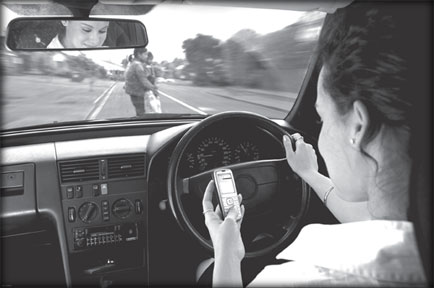Mobile phone addiction – a modern social malady
By Lionel Wijesiri
The proliferation of smartphones has plunged our world into a new era
of technology dependence. At one time, landlines and payphones were all
we had – and we did just fine. Now, it’s almost laughable if you don’t
own an iPhone or Smartphone or tab, and for some of us who do, we can’t
even survive an hour without them.
 |
|
Careless use of
smartphones can result in irrecoverable consequences |
Smartphone addiction is a real issue for modern society and, like
most addictions, people who are addicted to these modern gadgets don’t
truly realise how addicted they are. And even if you aren’t addicted
yourself, chances are that you know someone who is.
Young people who use mobile phones for many hours a day - talking and
sending messages or checking missed calls – may develop psychological
disorders, said a recent study that advises ‘reasonable use’ for
positive effects.
Francisca Lopez Torrecillas, a lecturer at the Department of
Personality and Psychological Assessment and Treatment of the University
of Granada, conducted a survey and reached this conclusion.
Mobile addicts tend to neglect important activities, drift away from
friends and close family, deny the problem and think about their mobile
phone constantly when they do not have it with them, Torrecillas said.
Most mobile-addicts will eventually become people with low
self-esteem, have problems with developing social relations and feel the
urge to be constantly connected and in contact with others, the study
indicated.
Break away
I’ll admit it: I too used to check my smartphone compulsively. And
the more I used it, the more often the urge to look at it hit me: In my
office, walking down the lane for a stroll, in meetings, even while
taking breakfast or lunch. Sometimes, I had it in my hand even before I
knew what I was searching for. Sometimes, I tapped the screen
absent-mindedly - looking at my email, a local blogger, my calendar or
Twitter.
Now, it’s all over. I managed to get rid of the addiction. Once you
are determined, the process is not too difficult. A true addiction
entails a growing tolerance to a substance (think drugs or alcohol) so
you need more to get ‘high’, uncomfortable symptoms during withdrawal,
and a harmful impact on your life. Computer technologies can be
addictive, because they’re ‘psychoactive’. That is, they alter the mood
and often trigger enjoyable feelings.
So, in simple terms, you may be addicted to the smartphone if your
smartphone is so ingrained in your routine and life that breaking away
from it causes you psychological anxiety.
Reality check
Psychiatrist and psychotherapist Dr. Anjali Chabria said that
smartphone addiction has definitely increased in the past few years and
it is something which probably is the target of phone manufacturing
companies today. “Coming to it from a user’s point of view, everyone’s
need for a phone varies; so does everyone’s time spent on the phone.
Having more facilities and accessibility does tempt individuals to
use it more than required, and for some individuals, it can be an
addiction. The reason behind this addiction could be lack of impulse
control and restlessness. We have seen quite a few cases of smartphone
addiction especially among teenagers,” she said.
In his practice, Consultant Psychiatrist Dr Milan Balakrishnan has
found that low-self-esteem is a risk factor for such addictions.
“Parents come forward with a child who is lost in his/her phone to an
extent that he/she does not interact with parents or siblings. He/she
does not interact or meet with friends except in the virtual world,” Dr
Balakrishnan said.
According to Dr. Balakrishnan, for something to be called an
addiction, it needs to fit certain criteria, some of which are:
* The person should be constantly preoccupied with his/her smartphone
to an extent that it takes priority over all his/her relationships or
interests. Eg. constantly using the phone during an important meeting or
while at dinner with the family.
* Spending an increasing amount of time on the phone, more than is
required, for routine calls, important messages and email.
* An inability to restrict cellphone use in spite of knowing the
harmful effects such as phone bills that exceed one’s budget and a
desire to buy expensive upgrades.
* A jitteriness, restlessness or anxiety and severe craving when not
able to use the phone and great relief and pleasure when it can be used
again.
* Sleeping with the phone placed close by and repeatedly waking up to
check for messages and status updates.
At work
Subashi Ferdinandz, a business professionalism trainer, said that
smartphone abuse is the number one issue she is asked to address when
called in to work with corporate staff. “It’s a huge problem. People
can’t put down their phones,” she said. “I think there is a huge
addiction factor. You have to be able to look at the phone and ask
yourself: ‘Can I put this away?’ ”
 |
|
Smartphone addiction is a real issue
for modern society, particularly the young generation |
“If you can’t go for lunch without having your phone on the table,
you don’t have time to go for lunch,” she said. “If you can’t get
through a meeting without having your phone on the table in front of
you, you don’t have time for that meeting.”
“When you take a call in front of someone else, what you are saying
is that the person on the phone is more important than the person in the
room. It sends the wrong message.”
“You can’t do two things at once,” Subashi said. “In a job interview,
or a sales situation, such behaviour could cost you that opportunity.
Spending a lot of time kibitzing on your smartphone does not make you
look more important. On the contrary, you don’t see people of
distinction or diplomats with phones in their hands. It’s rude.”
Other transgressions include the “cell yell” (raising your voice when
talking on a cellphone), texting on dates and during religious services,
using your smartphone in a grocery lineup and slowing things down
because you cannot focus on your transaction and texting with a bright
screen in a movie theatre.
Solution
The simplest solution would be to give smartphones the cold turkey
treatment until the addiction subsides, but that’s not always the most
practical answer.
* If you are addicted to your smartphone, it probably feels very
automatic to you. You check your smartphone without even realising that
you are doing it. One response, then, is to be very conscious of your
actions. Every time you check the phone, ask yourself, “Why am I
checking it?” It could be due to boredom, loneliness or anxiety. Once
you pinpoint the cause, you can find something else to alleviate the
problem.
* Turn off alert signals and notifications. Most text messages and
emails don’t require immediate attention (unless you are on a
time-sensitive job, in which case you may want to skip this suggestion).
Force yourself to check your phone only once every hour, or even less
often.
* Turn off your phone altogether. During those times when you don’t
need your phone, eg. during office hours, you may want to turn off your
phone. This forces you to go a long period without even touching it,
which can help offset addiction by making you less reliant on the phone.
* Find out what it is about the smartphone that’s addictive. Is it
social media? Then delete your Twitter and Flickr apps. Is it social
networking? Delete your Facebook app. Is it email? Disable push
notifications. This way, you can still use your smartphone without
having it consume so many hours of your day.
If you’re addicted to your smartphone, it’s never too late to fight
it. If you think a few of your friends may be addicted, then let them
know gently.
Addiction can be dangerous when it starts to interfere with work,
relationships and health. You may not want to tell your friend that he
is addicted to his phone, but if he is texting while driving, you may be
the one who saves his precious life. Think about that!
|



